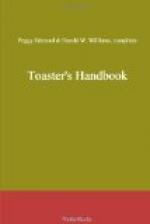ENGLISHMEN
He who laughs last is an Englishman.—Princeton Tiger.
Nat Goodwill was at the club with an English friend and became the center of an appreciative group. A cigar man offered the comedian a cigar, saying that it was a new production.
“With each cigar, you understand,” the promoter said, “I will give a coupon, and when you have smoked three thousand of them you may bring the coupons to me and exchange them for a grand piano.”
Nat sniffed the cigar, pinched it gently, and then replied: “If I smoked three thousand of these cigars I think I would need a harp instead of a grand piano.”
There was a burst of laughter in which the Englishman did not join, but presently he exploded with merriment. “I see the point” he exclaimed. “Being an actor, you have to travel around the country a great deal and a harp would be so much more convenient to carry.”
ENTHUSIASM
Theodore Watts, says Charles Rowley in his book “Fifty Years of Work Without Wages,” tells a good story against himself. A nature enthusiast, he was climbing Snowdon, and overtook an old gypsy woman. He began to dilate upon the sublimity of the scenery, in somewhat gushing phrases. The woman paid no attention to him. Provoked by her irresponsiveness, he said, “You don’t seem to care for this magnificent scenery?” She took the pipe from her mouth and delivered this settler: “I enjies it; I don’t jabber.”
EPITAPHS
LITTLE CLARENCE—“Pa!”
HIS FATHER—“Well, my son?”
LITTLE CLARENCE—“I took a walk through the cemetery to-day and read the inscriptions on the tombstones.”
HIS FATHER—“And what were your thoughts after you had done so?”
LITTLE CLARENCE—“Why, pa, I wondered where all the wicked people were buried.”—Judge.
The widower had just taken his fourth wife and was showing her around the village. Among the places visited was the churchyard, and the bride paused before a very elaborate tombstone that had been erected by the bridegroom. Being a little nearsighted she asked him to read the inscription, and in reverent tones he read:
“Here lies Susan, beloved wife of John Smith; also Jane, beloved wife of John Smith; also Mary, beloved wife of John Smith—”
He paused abruptly, and the bride, leaning forward to see the bottom line, read, to her horror:
“Be Ye Also Ready.”
A man wished to have something original on his wife’s headstone and hit upon, “Lord, she was Thine.” He had his own ideas of the size of the letters and the space between words, and gave instructions to the stonemason. The latter carried them out all right, except that he could not get in the “E” in Thine.
In a cemetery at Middlebury, Vt., is a stone, erected by a widow to her loving husband, bearing this inscription: “Rest in peace—until we meet again.”




